Completed evaluations
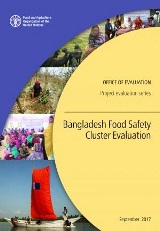
Bangladesh Food Safety Cluster Evaluation
29/09/2017
This report presents the findings of the evaluation on the FAO contribution to food safety in Bangladesh through two projects: Improving Food Safety and Institutionalization of Food Safety in Bangladesh for Safer Food.
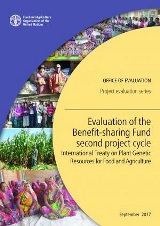
Evaluation of the Benefit-sharing Fund second project cycle International Treaty on Plant Genetic Resources for Food and Agriculture
29/09/2017
This report outlines the main findings, conclusions and recommendations of the independent evaluation of the second project cycle of the ITPGRFA. The evaluation focused on the 19 concluded projects funded between 2011 and 20151 under the first batch of BSF II.
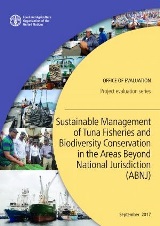
Sustainable Management of Tuna Fisheries and Biodiversity Conservation in the Areas Beyond National Jurisdiction (ABNJ)
20/09/2017
The purpose of a mid-term evaluation (MTE) is to provide an external assessment of a project’s progress toward achieving project results and expected outcomes, to identify design and implementation issues that need to be addressed, and to help strengthen the planning and delivery of project activities for the remainder of the project.
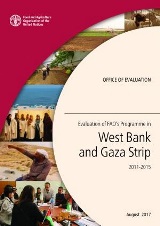
Evaluation of FAO’s Programme in West Bank and Gaza Strip 2011-2015
31/08/2017
The evaluation covered the entire programme implemented by FAO in the West Bank and Gaza Strip between 2011 and 2015, including activities funded through trust funds and FAO’s own resources. The evaluation’s framework of analysis was based on the goals of the two programming documents, the Plan of Action 2011-2013 and the Programme Framework 2014-2016.
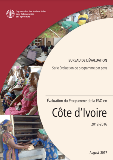
Evaluation of FAO's programme in Côte d’Ivoire 2012–2016
15/08/2017
Côte d'Ivoire has experienced a decade of political and military crisis which has strongly affected its development. Despite high growth rates since the end of the crisis, the country faces several challenges. Poverty and malnutrition remain high. Forest conservation in a growing economy, where commercial agriculture is expanding, is also a major challenge. (French only)
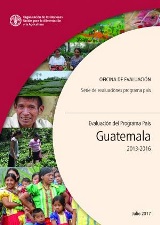
Evaluation of FAO’s Country Programme in Guatemala 2013-2016
31/07/2017
In 2016, the FAO Office of Evaluation Conducted the Evaluation of the FAO’s Country Programme in Guatemala during the period 2013- 2016. FAO's work in the country over the last four years has been guided by its Country Programming Framework (CPF) 2013-2016, prepared in 2012...
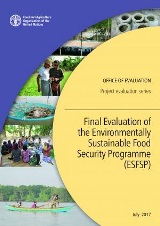
Final Evaluation of the Environmentally Sustainable Food Security Programme (ESFSP)
28/07/2017
This report presents the findings of an evaluation of the Environmentally Sustainable Food Security Programme (ESFSP) in the Republic of the Union of Myanmar. The aim of the ESFSP was to reduce the long-term vulnerability of rural populations affected by Cyclone Nargis in May 2008, through interventions supporting the recovery of the crops and fisheries sectors.
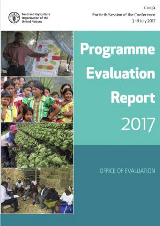
Programme Evaluation Report 2017
08/07/2017
This biennial Programme Evaluation Report covers the period of 2015-2016. The main purpose of the report is to provide Member Countries and other readers with an analytical summary of the emerging and recurrent trends in evaluations, and to discussthe main results, gaps and lessons found in FAO’s work.
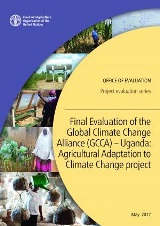
Final Evaluation of the Global Climate Change Alliance (GCCA) – Uganda: Agricultural Adaptation to Climate Change project
31/05/2017
The project contained three main components: i) improved knowledge and capacities for climate change adaption; ii) better access of livestock and crops to water through water for production; iii) increased resilience of agricultural production systems in the cattle corridor. The main purpose of the evaluation was to provide accountability to donors and key stakeholders; inform project management on achievements, challenges and lessons learned; and provide recommendations.
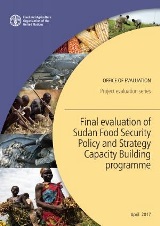
Final evaluation of Sudan Food Security Policy and Strategy Capacity Building programme
12/05/2017
The FSPS-CB programme was designed to support targeted state level government institutions in addressing capacity gaps related to: i) a food security inter-sectoral institutional coordination framework and food security policy and information system; and ii) the line ministries’ policy planning, budgeting, monitoring and implementation capacities.
